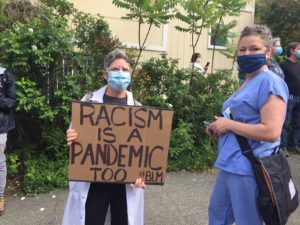
“I can’t breathe.” The current nationwide uprising against racism is taking place in the context of the COVID-19 pandemic. Health care workers on the frontlines of the struggle against the virus are acutely aware of the connections between systemic racism and the disproportionate impact of the pandemic on Black, Indigenous and Latino people. On a visceral level, doctors and nurses hear the words “I can’t breathe” from their COVID-19 patients — the exact same words repeated by George Floyd as he was being killed by Derek Chauvin.
Health care workers are standing up to say that they are not only interested in treating the physical symptoms of illness in their patients, they want systemic change to foster health and well-being and an end to institutional racism in medical care.
On June 4, health care workers in NYC, doctors, nurses and others came out at six hospitals out to take a knee in tribute to George Floyd and the struggle for Black Lives.
“We’ve seen so many patients complaining when they come into the emergency room saying they can’t breathe,” said Zach Reilly, MD, an internal medicine resident at Bellevue. “So knowing George Floyd was experiencing the same thing … it really hits close to home.” (Med Page Today)
“With our stethoscopes and white coats, we promised to do no harm and we must find the voice within us to break the silence like we are doing today,” said Kamini Doobay, MD, an emergency medicine resident at NYU Langone Health and Bellevue Hospital. “Not doing is doing when you see injustice and turn away, and that is why we are here to stand with black lives.” (Med Page Today)
In a similar solidarity action in Seattle on June 6, at least 7,000 healthcare workers marched from Harborview Hospital to City Hall. Among the crowd were signs reading “White coats for Black Lives,” “Racism is a public health emergency,” and other expressions of solidarity.
The night before, protesters had marched past Swedish Hospital and Harborview on their way from Capitol Hill to the Central District. Protesters chanted, “Thank you nurses,” as they marched past. Masked nurses in scrubs crowded the hospital windows, waving, raising their fists in solidarity and taking pictures. The feeling of solidarity was palpable.
A very poignant example of this growing solidarity between healthcare workers and the uprising was reported in Med Page Today in a story about a healthcare clinic in Minneapolis that was damaged in the rebellion. “As much as we wish we could have the clinic intact going forward, we understand and respect the revolutionary rage that led to this … and we are in full support and solidarity with our community. … Property is property and that can be sacrificed for justice,” said Andrea Westby, MD, of the Broadway Family Medicine Clinic in northern Minneapolis. Westby is also a professor of family medicine and community health at the University of Minnesota.
Some have raised fears that in the context of the pandemic and the re-opening of states, that mass protests may lead to a spike in COVID-19 cases. Answering this fear is an open letter signed onto by more than 1,000 public health experts and epidemiologists, supporting the uprising. The letter, initiated by public health experts at the University of Washington, declares, “White supremacy is a lethal public health issue that predates and contributes to COVID-19.” The letter continues: “Black people suffer from dramatic health disparities in life expectancy” resulting from “long-standing systems of oppression and bias which have subjected people of color to discrimination in the healthcare setting, decreased access to medical care and healthy food, unsafe working conditions, mass incarceration, exposure to pollution and noise, and the toxic effects of stress.”
The letter goes on:
“In addressing demonstrations against white supremacy, our first statement must be one of unwavering support for those who would dismantle, uproot, or reform racist institutions.
“Staying at home, social distancing, and public masking are effective at minimizing the spread of COVID-19. To the extent possible, we support the application of these public health best practices during demonstrations that call attention to the pervasive lethal force of white supremacy. However, as public health advocates, we do not condemn these gatherings as risky for COVID-19 transmission. We support them as vital to the national public health and to the threatened health specifically of Black people in the United States. We can show that support by facilitating safest protesting practices without detracting from demonstrators’ ability to gather and demand change. This should not be confused with a permissive stance on all gatherings, particularly protests against stay-home orders. Those actions not only oppose public health interventions, but are also rooted in white nationalism and run contrary to respect for Black lives. Protests against systemic racism, which fosters the disproportionate burden of COVID-19 on Black communities and also perpetuates police violence, must be supported.”
You can read here about the experts’ recommendations for public health response to the uprising and safest practices for protesters.





